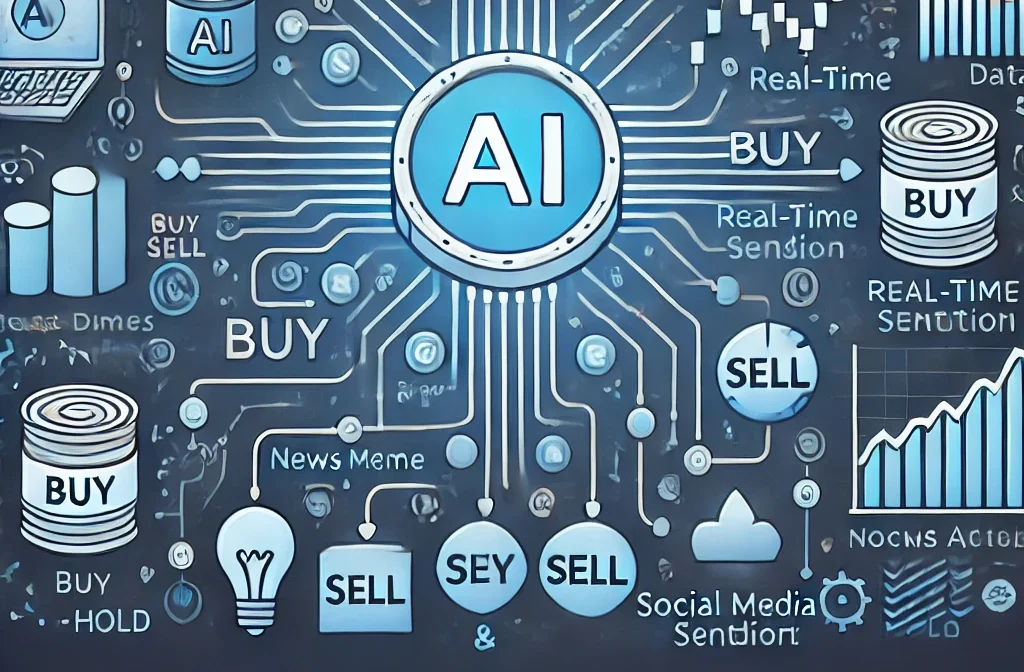Discover how AI in algorithmic trading empowers smaller retail investors with cost-efficient, automated strategies. Explore benefits, challenges, and top tools to start your AI trading journey.
Introduction
In the fast-paced world of financial markets, Artificial Intelligence (AI) is revolutionising how trades are executed, analysed, and optimised. Once the exclusive domain of institutional players, algorithmic trading powered by AI is now accessible to smaller retail investors, democratizing opportunities to compete in global markets. This article explores how AI is reshaping algorithmic trading for individual investors, as well as the benefits, challenges, and practical steps to leverage this transformative technology.
What is Algorithmic Trading?
Algorithmic trading uses computer programs to execute trades based on predefined criteria like price, timing, or volume. Automating decisions eliminates emotional biases and enables high-speed transactions. Traditionally, developing such systems required significant capital and expertise—barriers that AI is now breaking down for retail participants.
The Rise of AI in Financial Markets
AI’s integration into finance has exploded, with machine learning (ML), natural language processing (NLP), and neural networks driving predictive analytics, sentiment analysis, and risk management. Hedge funds and banks have long used AI for arbitrage and portfolio optimisation. Today, cloud computing and affordable AI tools are bringing these capabilities to Main Street investors.
SIP Investment Guide: Understanding SIPs and How to Choose the Best Plan for You
Democratizing Algorithmic Trading with AI
AI levels the playing field by offering tools once reserved for Wall Street:
-
Automated Strategy Development: Platforms like QuantConnect and Alpaca allow users to build, backtest, and deploy AI-driven strategies without coding expertise.
-
Sentiment Analysis: NLP algorithms scan news, social media, and earnings calls to gauge market mood, helping retail traders anticipate trends.
-
Predictive Analytics: ML models analyze historical data to forecast price movements, offering insights comparable to institutional-grade analysis.
Key Benefits of AI-Driven Trading for Retail Investors
-
Cost Efficiency: Low-cost platforms and open-source libraries (e.g., TensorFlow) reduce entry costs.
-
Emotion-Free Trading: AI executes strategies dispassionately, avoiding panic selling or FOMO buying.
-
24/7 Market Monitoring: AI bots track global markets in real-time, seizing opportunities even while you sleep.
-
Enhanced Risk Management: Algorithms incorporate stop-loss limits and diversify portfolios autonomously.
-
Backtesting Capabilities: Test strategies against historical data to refine accuracy before live deployment.
-
How Geopolitical Events Impact Indian Markets: Risks, Trends, and Strategies
Challenges and Considerations
While promising, AI-driven trading isn’t without risks:
-
Data Quality: AI models depend on clean, relevant data—garbage in, garbage out.
-
Overfitting: Strategies too tailored to past data may fail in live markets.
-
Technical Knowledge: A Basic understanding of ML concepts is essential to avoid misconfigurations.
-
Regulatory Compliance: Ensure platforms comply with local trading laws and tax regulations.
AI Tools and Platforms for Retail Traders
-
Robo-Advisors: Services like Betterment and Wealthfront use AI to manage portfolios based on risk tolerance.
-
Retail Brokerage Integrations: Platforms like Robinhood and eToro incorporate AI for personalised insights.
-
API Access: TD Ameritrade and Interactive Brokers offer APIS to integrate custom AI models.
Getting Started with AI in Trading
-
Educate Yourself: Learn ML basics via Coursera or Udemy courses.
-
Start Small: Use paper trading accounts to test strategies risk-free.
-
Choose the Right Tools: Explore user-friendly platforms like MetaTrader with AI plugins.
-
Stay Updated: Follow fintech trends and join communities like Reddit’s r/algotrading.
Future Trends: AI and the Retail Trading Revolution
-
Hyper-Personalisation: AI will tailor strategies to individual financial goals and risk profiles.
-
Quantum Computing: Faster processing could unlock real-time predictive analytics.
-
Decentralised Finance (DeFi): AI may automate trades in crypto and blockchain-based markets.
Conclusion
AI is a game changer for retail investors, offering tools to compete with institutional giants. While challenges like data quality and technical barriers exist, the benefits—cost savings, automation, and enhanced decision-making—are transformative. By embracing AI-driven algorithmic trading, smaller investors can unlock new opportunities in an increasingly digital financial landscape. Start exploring AI tools today, but tread wisely: continuous learning and cautious experimentation are key to long-term success.
AI and Automation: Revolutionising the Indian Stock Market in 2025-26

